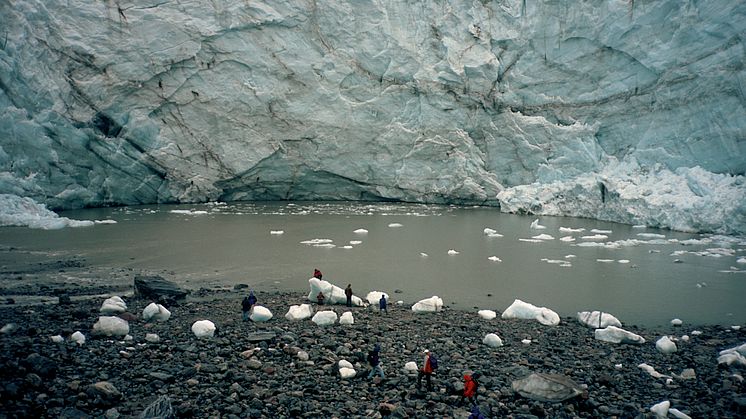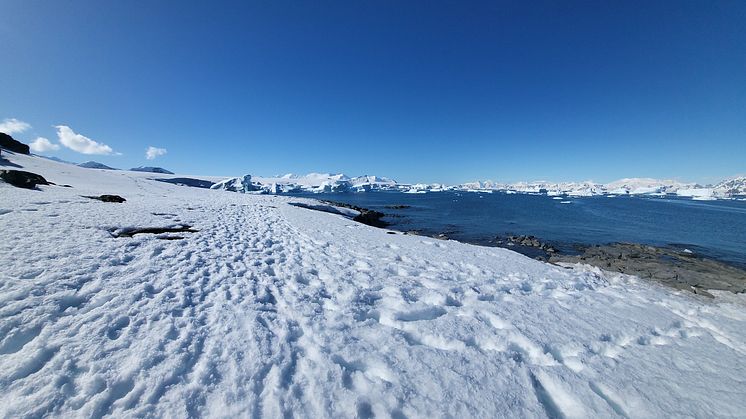
Press release -
How future research can help improve projections on rising sea levels
A new research synthesis co-authored by an international group of 29 ice sheet experts states that future rises in sea level could be better estimated by gaining a clearer understanding of the Antarctic and Greenland ice sheets.
Global climate change and its impact on sea levels is a pressing issue and trying to accurately predict just how much they will rise in future is subject to ongoing analysis. The changing nature of ice sheets is a vital factor in the projection of future sea level rise.
Led by the University of Lincoln and involving Dr Sammie Buzzard from the Centre for Polar Observation and Modelling (CPOM), as well as four glaciologists from Northumbria University, the paper has been published in the leading journal, Nature Reviews Earth & Environment.
A prominent aspect of the study highlights that short-term fluctuations in climate could have an amplification ‘feedback’ effect, meaning that ice sheets are more sensitive to climate change than previously understood.
Until the 1990s, it was commonly thought that ice sheets in Antarctica and Greenland, which lock up water equivalent to an increase of 65 metres of global sea level rise, were relatively static and slow to respond to climate change. With the advent of satellite observations and advances in numerical modelling, this view has changed.
Recent developments synthesized in this new paper have provided further evidence that these huge glaciers respond in far quicker and in unexpected ways as the climate warms, similar to the frequency and intensity that hurricanes and heatwaves change with the climate. Ground and satellite observations, and the development of numerical climate models demonstrate that sudden heatwaves and large storms can have long-lasting effects on the ice sheets. Extreme weather can lead to widespread melt events, such as the Greenland Ice Sheet melt in July 2023, or cause ice shelves to disappear almost overnight.
Edward Hanna, Professor of Climate Science and Meteorology at the University of Lincoln, said: “The patterns, processes and impacts of ice-sheet variability on different timescales from days through to millennia are not well understood. Failing to account for such variability can in turn result in biased projections of multi-decadal future ice-sheet mass loss. The time to act is now, and improving projections through collaborative efforts will help us pave the way for a more sustainable future.”
The research discusses the demand to monitor and simulate short and long-term timescales of changes in ice sheet behaviour. This will help to reduce uncertainty in future sea level rise projections and better prepare for the impacts of climate change.
Jan De Rydt, Associate Professor of Glaciology in the Department of Geography and Environmental Sciences at Northumbria University, said: “Recent research has shown that the impact of extreme weather events, such as heatwaves, should be considered alongside the impact of steadily rising global temperatures in order to fully understand the future of the Antarctic and Greenland Ice Sheets. The interplay between short and long-lived changes in the atmosphere and ocean will determine how fast the ice sheets melt, and how much sea level will rise as a result.”
Dr Buzzard, Director of Knowledge Exchange at CPOM which is led by a directorate of academics based at Northumbria University, added: “Understanding how Antarctica and Greenland will behave in the future is essential for predicting how much sea level rise we should expect so we can plan for and mitigate for this. What happens in the polar regions has consequences for all of us.”
The research was sponsored by the World Climate Research Programme’s Climate and Cryosphere project, the International Arctic Science Committee, and the Scientific Committee on Antarctic Research.
Northumbria University has one of the world’s largest groups of glaciologists studying the interactions between ice sheets and oceans. As well as Dr De Rydt, Professor Hilmar Gudmundsson, Dr Ronja Reese and Dr Sainan Sun from University’s The Future of Ice on Earth group, were all involved in the research.
The paper, Short and long-term variability of the Antarctic and Greenland ice sheets, is published in Nature Reviews Earth & Environment.
Topics
Categories
UNIVERSITY OF THE YEAR 2022 (Times Higher Education Awards)
Northumbria is a research-intensive university that unlocks potential for all, changing lives regionally, nationally and internationally. Find out more about us at www.northumbria.ac.uk
--- Please contact media.communications@northumbria.ac.uk with any media enquiries or interview requests ---











